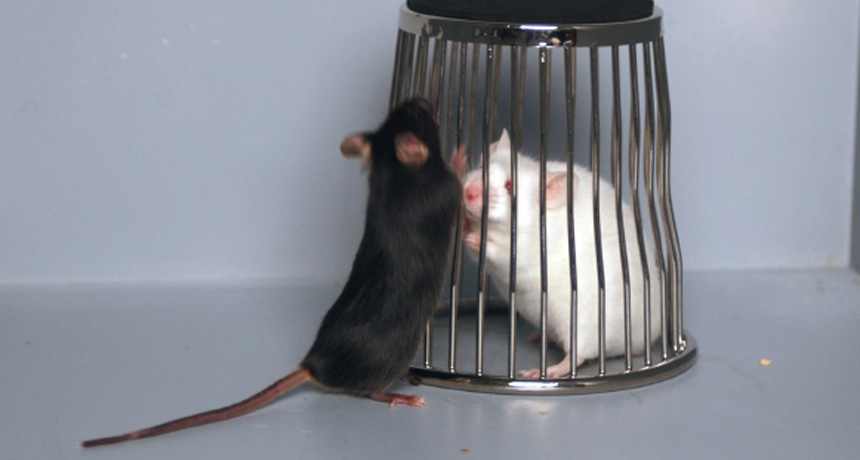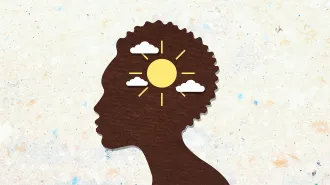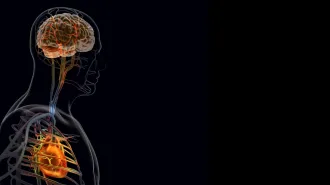Immune system may remember and adapt to stress
Adversity may act similar to a vaccine, stimulating resilience

BEING SOCIAL Mice with incomplete immune systems, like the black mouse, become more social after a transplant of immune cells from stressed mice, which suggests that the immune system may adapt to adversity.
Courtesy of Miles Herkenham
Stress may act a bit like a vaccine, spurring the immune system to build up resilience to it.
A new study in mice shows that immune cells can create a memory of stress and possibly defend the body against the ill effects of adversity. The results, published in the Jan. 28 Journal of Neuroscience, also indicate that some immune cells could become good targets for developing treatments for anxiety and depression.
In the experiment, researchers injected immune cells from stressed mice into the veins of mice bred to have partially ineffective immune systems. After receiving the cell transplant, the recipient mice became less anxious and more social. “That was a surprise,” says Miles Herkenham, a neurophysiologist at the National Institutes of Health in Bethesda, Md. “We expected the cells to make the mice more anxious and depressed.”
The antidepressant effect may be the result of the immune system developing some kind of memory of stress. When transplanted into the mice lacking a complete immune system, the cells exert their protective benefits, similar to the way antibodies build up after a vaccination to combat a future infection, Herkenham and his colleagues argue.
“This is a very important paper,” says neuroimmunologist Michal Schwartz of the Weizmann Institute of Science in Rehovot, Israel. It adds evidence to the idea that the adaptive immune system can protect the brain, increase resilience to mental stress and support formation of new neurons in adulthood, she says. It also shows that the immune system retains memory of psychological stress.
The immune system has two branches: innate and adaptive. Cells in the innate immune system act as the first line of defense against infection. Those in the adaptive immune system create a memory of infectious microbes to provide a quick response during later invasions. Previous studies focused on the innate immune system’s relationship to stress and suggested that stress could cause a dangerous downward spiral, as the innate immune system pumped up levels of inflammation that could continually impact the brain. Inflammation has been linked to mood and anxiety disorders and autism. Few experiments, however, have looked at the effects of chronic stress on the adaptive immune system and the role it plays in anxiety and depression.
Schwartz, who was not part of the new study, and her colleagues first showed a beneficial connection between adaptive immune cells — white blood cells called T cells — and the central nervous system in 1999. Her team later found that the cells played a role in coping with stress and in learning. In the new study, mice grew cells in the hippocampus — a region of the brain that plays a leading role in learning and memory — more quickly after receiving a transplant of stressed immune cells. This rapid addition of cells may be what makes the mice less anxious and more social.
“The new results fit nicely with the emerging literature that T cells are good guys for the brain and essential for normal brain function,” says Andrew Miller, a psychiatrist and behavioral immunologist at Emory University in Atlanta. “One question that comes to my mind, though, is why aren’t the stressed animals able to take advantage of their own T cells and have the antianxiety effects?”
In the study, mice became stressed when they had to repeatedly deal with an intruder mouse in their territory. The setup is like dealing with the neighborhood bully, but also reflects other types of stress in humans, Herkenham says. After 14 days of being bullied, the stressed mice had high levels of proteins that play a role in inflammation in their blood. These proteins, called cytokines, send messages between immune cells and can either spur inflammation or suppress it. Stressed, donor mice had more cytokines that promote inflammation, while the ones receiving the stressed immune cells had more anti-inflammatory cytokines after the transplant. This pattern was the same for microglia, immune cells in the brain that engulf and destroy destructive microbes and substances. Microglia also play a role in inflammation.
Miller suggests that in the stressed mice, something may be preventing the protective, adaptive immune system cells from trafficking to the brain. “That may be why the stressed mice can’t cash in on their own adaptive immune response to stress,” he says.
Whether or not the donor mice are using their own cells to combat stress is not clear. “Building resiliency could be ongoing, but the effect on anxiety and depression could be masked or overwhelmed,” Herkenham says. It’s also not clear if the effects of stress would be worse if the adaptive immune response didn’t happen at all, he says.
Identifying which immune cells are responsible for building the resiliency to stress may help to answer that question. Herkenham and his team are now focusing on the roles that specific T cells and cytokines play in communication between the adaptive immune system and the brain. If scientists can determine the precise roles that specific immune cells play in adapting to stress, researchers could target those cells in treating anxiety and depression.
“It’d be a dream for us all to have a vaccine, one that could increase mental resilience,” Schwartz says.







